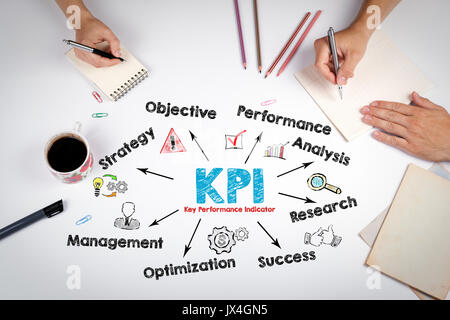
The need to measure and track progress is a fundamental principle of achieving success in any endeavor. In the world of business, this principle is intrinsically tied to the concept of Key Performance Indicators (KPIs). KPIs are powerful tools that provide businesses with key insights into their operational effectiveness, enabling them to unlock their true potential and drive meaningful results.
At their core, KPIs are quantifiable metrics that reflect the strategic objectives of an organization. These metrics define what success looks like and allow businesses to effectively gauge their progress towards their goals. By analyzing and interpreting KPI data, companies can gain invaluable insights into various aspects of their operations, ranging from financial performance to customer satisfaction, employee productivity, and more.
The power of KPIs lies not only in their ability to provide a snapshot of current performance but also in their potential to drive improvement and growth. By identifying the key drivers behind KPI performance, businesses can make informed decisions and take targeted actions to optimize their operations. KPIs enable organizations to measure success, identify areas for improvement, set realistic targets, and track progress over time, ultimately leading to increased efficiency, profitability, and overall success.
As we delve deeper into the world of KPIs, we will explore different types of KPIs, best practices for selecting and implementing them, and the impact they can have on organizational performance. Unlocking the power of KPIs is not only about having the right metrics in place but also about leveraging them effectively to drive positive change. So, let us embark on this journey together to unveil the true potential of Key Performance Indicators and discover how they can unlock success for businesses of all kinds.
Understanding Key Performance Indicators
In the world of business, Key Performance Indicators (KPIs) are crucial for measuring and tracking an organization’s progress towards its strategic goals. These performance metrics provide valuable insights into the overall performance and health of a company. By analyzing the right KPIs, businesses can make data-driven decisions and unlock their path to success.
KPIs serve as quantifiable markers that help businesses evaluate their performance in various areas, such as sales, marketing, customer satisfaction, and financial stability. They provide a clear picture of where a company stands and highlight areas that require attention or improvement. By setting specific goals and aligning them with corresponding KPIs, organizations can monitor their progress and make necessary adjustments to stay on track.
Effective KPIs are defined based on an organization’s unique objectives and industry benchmarks. They are measurable, meaningful, relevant, and time-bound. For instance, in sales, KPIs may include metrics such as revenue growth, customer acquisition rate, or conversion rate. These indicators help sales teams to evaluate their performance and identify areas for improvement. By regularly tracking these KPIs, businesses can optimize their sales strategies and drive better results.
To leverage the power of KPIs, organizations need to establish a systematic and well-structured approach. This involves identifying and selecting the most relevant KPIs, leveraging technology to collect and analyze data, and ensuring effective communication and collaboration across different departments. By integrating KPIs into performance management systems, organizations can foster a data-driven culture that focuses on continuous improvement and more efficient decision-making.
In conclusion, Key Performance Indicators play a vital role in measuring, evaluating, and improving a company’s overall performance. By understanding the power of KPIs and implementing them effectively, businesses can unlock the path to success and optimize their operations in various areas.
Selecting the Right KPIs
When it comes to unlocking success through Key Performance Indicators (KPIs), selecting the right ones is of utmost importance. Properly identifying and utilizing KPIs can make a significant impact on an organization’s overall performance and ability to achieve its goals. Without further ado, let’s delve into the process of selecting the right KPIs.
-
Understand Your Objectives: The first step in selecting the right KPIs is to have a clear understanding of your objectives. What are you trying to achieve as an organization? Are you looking to increase sales, improve customer satisfaction, or streamline operational processes? By identifying your objectives, you can align your KPIs with your desired outcomes.
-
Focus on Relevance: It’s crucial to choose KPIs that are relevant to your specific industry and business model. Each organization has its unique set of priorities and challenges, so it’s essential to select KPIs that accurately measure the progress and success of your specific goals. Consider what metrics will provide valuable insights into the areas that matter most to your business.
-
Keep it S.M.A.R.T.: Selecting KPIs that are specific, measurable, attainable, relevant, and time-bound (S.M.A.R.T) is another key aspect of the process. This enables you to set clear benchmarks and track progress effectively. The chosen KPIs should provide actionable data that facilitates decision-making and helps drive improvement.
By carefully selecting the right KPIs, organizations can harness their power to unlock success in their respective fields. Remember, understanding your objectives, focusing on relevance, and setting S.M.A.R.T goals are essential factors to consider when embarking on this journey. Stay tuned for the final section of our article, where we will explore the implementation and monitoring of KPIs.
Utilizing KPIs for Business Success
Effective utilization of Key Performance Indicators (KPIs) is crucial for achieving business success. By using KPIs, businesses gain valuable insights into their performance and can make informed decisions to drive growth and profitability.
KPIs serve as quantifiable measures that help organizations evaluate how well they are progressing towards their goals. These indicators provide a clear understanding of various aspects of business performance, such as sales figures, customer satisfaction levels, or operational efficiency.
When used correctly, KPIs enable businesses to identify areas of improvement and take proactive measures to address any issues. By regularly monitoring and analyzing KPIs, companies can track their progress over time and detect trends or patterns that might impact their overall success.
Furthermore, KPIs facilitate effective strategic planning by aligning objectives with measurable targets. With clearly defined KPIs in place, businesses can set realistic goals, prioritize activities, and allocate resources accordingly. This helps in optimizing performance and streamlining operations, fostering a culture of continuous improvement.
In conclusion, incorporating Key Performance Indicators into business strategies is vital for driving success. By leveraging the power of KPIs, organizations gain valuable insights, make data-driven decisions, and stay ahead of the competition. Embracing KPIs as a fundamental aspect of performance management can lead to enhanced productivity, improved customer satisfaction, and ultimately, long-term sustainability.

